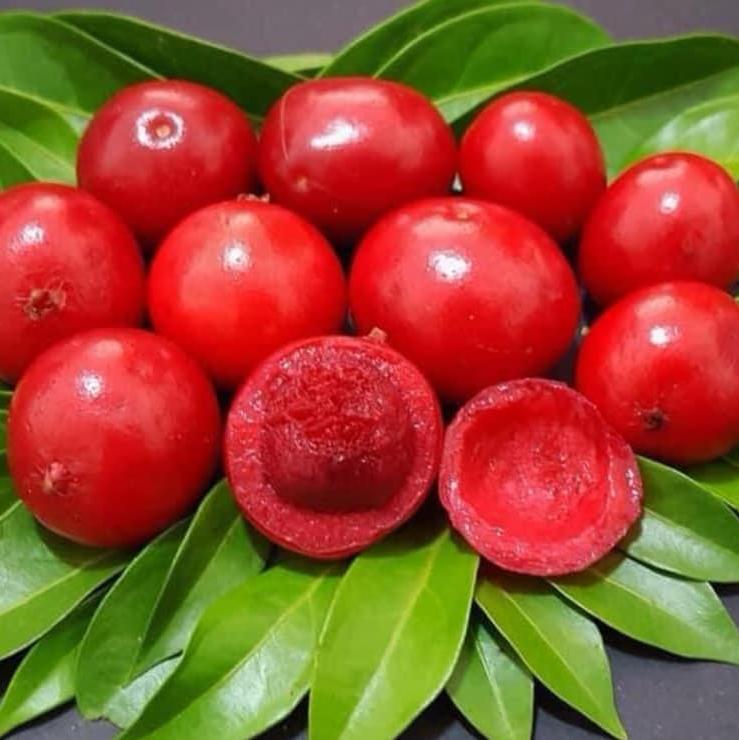Love it? Add to your wishlist
Your favorites, all in one place. Shop quickly and easily with the wishlist feature!
[message]
[title]
[message]


Veliyath Gardens
Couldn't load pickup availability
Ubaia (Eugenia patrisii)
Common Name: Ubaia
Botanical Name: Eugenia patrisii
Cultivation Details:
Bloom Time/Fruiting: 3 to 4 Years.
Maintenance Required: Moderate.
The Ubaia fruit plant (Eugenia patrisii) is a lesser-known tropical gem native to the dense rainforests of South America, spanning Brazil, Bolivia, Peru, Ecuador, Colombia, Venezuela, and the Guyanas. This evergreen tree, renowned for its charming appearance and delicious fruits, thrives in home gardens across tropical regions, where it provides both culinary and ornamental value. Its delectable fruit, measuring around 4 cm in diameter, boasts a thin skin and succulent, aromatic pulp with a delightful sweet flavor that has been cherished for generations.
The Ubaia plant is a slow grower in its early years, particularly when grown in shady locations, making it ideal for shaded garden spaces or understory plantings. With its enchanting green foliage and nutrient-rich fruit, the Ubaia is a fantastic addition to tropical fruit gardens, perfectly blending aesthetic beauty with practical benefits.
The Ubaia has deep roots in the indigenous cultures of South America, where its fruits have long been harvested from the wild and incorporated into local diets. Known for its delicate balance of sweetness and aromatic flavor, the fruit is not only consumed fresh but has also been used to create traditional dishes, such as jellies, sweets, and even ice creams. Its versatility and unique taste made the Ubaia a prized fruit among the early inhabitants of the region.
In addition to its culinary uses, the Ubaia plant holds significant value as an ornamental tree, cherished in local home gardens for its attractive evergreen foliage and pleasant scent. Over time, its cultivation spread beyond its native regions, making its way into exotic plant nurseries and gardens around the world, where it continues to captivate plant lovers and tropical fruit enthusiasts alike.
The Ubaia tree plays a critical role in its native environment, contributing to the health of the tropical ecosystems where it grows. Its dense, evergreen foliage provides shelter and food for a variety of wildlife, including birds and small mammals, which feed on the sweet fruits. This supports local biodiversity and helps maintain the ecological balance of the region.
Moreover, the Ubaia is well-suited for sustainable gardening practices. Its ability to thrive in shaded environments makes it a valuable plant for under-canopy growth, helping to reduce soil erosion and improve soil quality. The tree’s presence also contributes to carbon sequestration, making it a powerful ally in the fight against climate change. As an essential part of the rainforest ecosystem, the Ubaia promotes environmental health while providing humans with nutrient-rich, delicious fruits.
The Ubaia fruit is more than just a tropical delicacy; it is also packed with essential nutrients that offer a wide range of health benefits. Rich in fibers, micronutrients, and vitamins, the fruit is a natural source of antioxidants, helping to combat free radical damage in the body. It contains a high level of phenolic compounds and other phytochemicals, which are associated with reducing the risk of various chronic diseases.
Regular consumption of Ubaia fruit can help reduce the risk of cancer, inflammation, and cardiovascular diseases, while also supporting neurodegenerative health. The presence of antioxidants in the fruit is known to benefit eye health, potentially reducing the risk of cataracts and macular degeneration. With its natural medicinal properties, the Ubaia fruit provides an easy and delicious way to incorporate health-boosting nutrients into your daily diet.
The Ubaia plant is moderately easy to grow, making it an excellent choice for gardeners looking to expand their collection of exotic fruit plants. While it thrives in the tropical and subtropical climates of its native South America, the Ubaia is relatively adaptable and can be grown in exotic fruit gardens worldwide, provided that it is given the proper care.
To cultivate Ubaia, it’s essential to plant it in well-drained soil with adequate moisture. The tree prefers shaded locations, particularly in its early years, as it grows slowly when young. After 3 to 4 years, the Ubaia begins to bloom and bear fruit, rewarding gardeners with its vibrant, sweet fruits. Maintenance is moderate, requiring regular watering and occasional pruning to keep the tree healthy and promote better fruit yield.
At Veliyath Gardens, we ensure that our Ubaia plants are grown in optimal conditions, ready to flourish in your garden or plant nursery. Whether you’re interested in its ornamental value or its delicious fruits, the Ubaia is a rewarding addition to any exotic fruit plant garden.
The Ubaia (Eugenia patrisii) represents the perfect fusion of culinary delight, nutritional value, and environmental contribution. Its attractive evergreen foliage makes it an appealing choice for home gardens, while its nutrient-packed fruit offers a wide array of health benefits. For those looking to add an exotic fruit tree to their collection, the Ubaia is a standout choice that promises both beauty and flavor.
At Veliyath Gardens, we pride ourselves on offering high-quality exotic fruit plants like the Ubaia to our valued customers. Whether you’re a seasoned gardener or just beginning your journey into the world of tropical plants, the Ubaia will make an excellent addition to your fruit plant garden, providing years of enjoyment and bountiful harvests.
To cultivate Ubaia, it’s essential to plant it in well-drained soil with adequate moisture. The tree prefers shaded locations, particularly in its early years, as it grows slowly when young. After 3 to 4 years, the Ubaia begins to bloom and bear fruit.
The Ubaia fruit is more than just a tropical delicacy; it is also packed with essential nutrients that offer a wide range of health benefits. Rich in fibers, micronutrients, and vitamins, the fruit is a natural source of antioxidants, helping to combat free radical damage in the body.
The Ubaia plant is a slow grower in its early years, particularly when grown in shady locations, making it ideal for shaded garden spaces or understory plantings. With its enchanting green foliage and nutrient-rich fruit, the Ubaia is a fantastic addition to tropical fruit gardens, perfectly blending aesthetic beauty with practical benefits.



